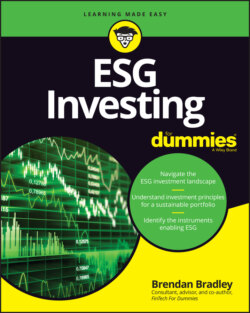Читать книгу ESG Investing For Dummies - Brendan Bradley - Страница 19
Determining whether ESG delivers good investment performance
ОглавлениеESG integration is consistent with a manager’s fiduciary duty to take into account all relevant information and material risks. It should be remembered that ESG integration isn’t just a negative screen in the investment process that limits one’s investment universe. Therefore, because it includes a more thorough application of traditional financial analysis, it isn’t constrained by reduced diversification and can include companies with poor ESG ratings if they are believed to be “mending their ways.”
Along these lines, nearly all large institutional investors are using ESG data in some capacity. More specifically, the PRI members have pledged to incorporate ESG issues into investment decision-making processes. For example, BlackRock, the world’s largest asset manager, has announced that sustainability, including a company’s ESG performance, will be BlackRock’s new standard for investing. In addition, one of the key reasons that firms undertake ESG analysis is to assess risk. However, such ESG analysis is also a way of uncovering investing opportunities by spotting companies that are improving their ‘E,’ ‘S,’ or ‘G’ profiles before the broader market does.
So, although the ESG trend was well underway before the COVID-19 crisis in 2020, it has served as the first main confirmation that ESG-informed investing doesn’t come at a cost to performance and can be a guide to future-proof investments while boosting returns. This has proven the resilience of ESG investing and provided a significant boost to sustainability while the world is establishing how to “build back better.” Nevertheless, some investors rightly highlight the concept of “ESG momentum,” produced by the sheer weight of money that has flown into “good” companies that are expected to become the champions of the future. Performance data can be inconsistent and period-dependent, but there is also evidence that over the long term, ESG has outperformed relative to the broader market.
On the other hand, some investors question whether ESG stocks exhibit true alpha and contend that the stock market returns from technology stocks in recent times have fueled ESG performance, given that the typical ESG mutual fund has at least 20 percent of its assets in technology stocks. If the technology bubble bursts (perhaps due to anti-trust enforcement), and as investors move toward value stocks (which should be ESG-friendly as well!) and away from growth stocks, where will the alpha or additional performance for ESG strategies come from? Just be aware of the potential for a speculative bubble in ESG investing.
